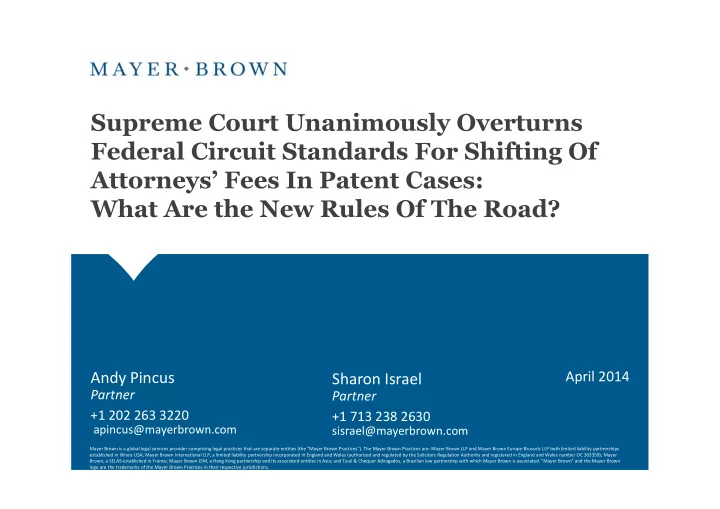

Supreme Court Unanimously Overturns Federal Circuit Standards For Shifting Of Attorneys’ Fees In Patent Cases: What Are the New Rules Of The Road? Andy Pincus April 2014 Sharon Israel Partner Partner +1 202 263 3220 +1 713 238 2630 apincus@mayerbrown.com sisrael@mayerbrown.com Mayer Brown is a global legal services provider comprising legal practices that are separate entities (the "Mayer Brown Practices"). The Mayer Brown Practices are: Mayer Brown LLP and Mayer Brown Europe-Brussels LLP both limited liability partnerships established in Illinois USA; Mayer Brown International LLP, a limited liability partnership incorporated in England and Wales (authorized and regulated by the Solicitors Regulation Authority and registered in England and Wales number OC 303359); Mayer Brown, a SELAS established in France; Mayer Brown JSM, a Hong Kong partnership and its associated entities in Asia; and Tauil & Chequer Advogados, a Brazilian law partnership with which Mayer Brown is associated. "Mayer Brown" and the Mayer Brown logo are the trademarks of the Mayer Brown Practices in their respective jurisdictions.
The Federal Circuit and the Supreme Court • Federal Circuit is 0-3 on patent cases, with no votes in support of its decisions • Three more patent cases remain to be decided this term • Supreme Court’s interest in patent law issues likely to remain high remain high 2
Octane – Standard for Fee-Shifting Under Section 285 • Section 285: “The court in exceptional cases may award reasonable attorney fees to the prevailing party.” • Federal Circuit ( Brooks Furniture , 2005) – ”when there has been some material inappropriate conduct related to the matter in litigation, such as willful infringement, related to the matter in litigation, such as willful infringement, fraud or inequitable conduct in procuring the patent, misconduct during litigation, vexatious or unjustified litigation, conduct that violates Fed. R. Civ. P. 11, or like infractions.” – ” if both (1) the litigation is brought in subjective bad faith, and (2) the litigation is objectively baseless.” – “underlying improper conduct and the characterization of the case as exceptional must be established by clear and convincing evidence.” 3
Octane – Standard for Fee-Shifting Under Section 285 • Supreme Court: – “[i]n 1952, when Congress used the word in §285 (and today, for that matter), ‘[e]xceptional’ meant ‘uncommon,’ ‘rare,’ or ’not ordinary’” – “exceptional case” is one that – “exceptional case” is one that • “ stands out from others with respect to the substantive strength of a party’s litigating position (considering both the governing law and the facts of the case) • or the unreasonable manner in which the case was litigated. • District courts may determine whether a case is exceptional in the case-by-case exercise of their discretion, considering the totality of the circumstances.” 4
Octane – Standard for Fee-Shifting Under Section 285 • Supreme Court: – “[A] case presenting either subjective bad faith or exceptionally meritless claims may sufficiently set itself apart from mine-run cases to warrant a fee award” – Preponderance of evidence standard governs – Preponderance of evidence standard governs • Supreme Court’s critique of Federal Circuit – “The Federal Circuit’s formulation is overly rigid” – Federal Circuit approach “superimposes an inflexible framework onto statutory text that is inherently flexible” – Brooks Furniture is “so demanding that it would appear to render Section 285 largely superfluous” 5
Highmark – Standard for Appellate Review of Section 285 Determinations • Federal Circuit: – Question whether litigation is “objectively baseless” reviewed by court of appeals de novo • Supreme Court: – “Because §285 commits the determination whether a case is – “Because §285 commits the determination whether a case is ‘exceptional’ to the discretion of the district court, that decision is to be reviewed on appeal for abuse of discretion.” – Fn. 2: “The abuse-of-discretion standard does not preclude an appellate court’s correction of a district court’s legal or factual error: ‘A district court would necessarily abuse its discretion if it based its ruling on an erroneous view of the law or on a clearly erroneous assessment of the evidence.’” 6
Impact of Octane and Highmark • Transfer of authority to district courts – Governing legal tests – More deferential appellate review • Ability to take account of all facts and circumstances – elimination of rigid rules elimination of rigid rules • Fees may be awarded based solely on lack of merit of claim or defense, even if party did not act with subjective bad faith 7
Proposals Pending in Congress • H.R. 3309 - The Innovation Act (Passed the House, as amended, 12/5/13): ‘‘§ 285. Fees and other expenses ‘‘(a) AWARD.—The court shall award, to a prevailing party, reasonable fees and other expenses incurred by that party in reasonable fees and other expenses incurred by that party in connection with a civil action in which any party asserts a claim for relief arising under any Act of Congress relating to patents, unless the court finds that the position and conduct of the nonprevailing party or parties were reasonably justified in law and fact or that special circumstances (such as severe economic hardship to a named inventor) make an award unjust. 8
Proposals Pending in Congress • S.1720 – Patent Transparency and Improvements Act Schumer Cornyn Compromise (informally circulated): “(a) AWARD--- In connection with a civil action in which any party asserts a claim for relief arising under any Act of Congress relating to patents, upon on a motion by a prevailing party, the relating to patents, upon on a motion by a prevailing party, the court shall determine whether the position of the non- prevailing party was objectively reasonable in law and fact, and whether the conduct of the non-prevailing party was objectively reasonable. If the court finds that the position of the non-prevailing party was not objectively reasonable in law or fact or that the conduct of the non-prevailing party was not objectively reasonable, it shall award reasonable attorney’s fees unless special circumstances make an award unjust.” 9
Recommend
More recommend